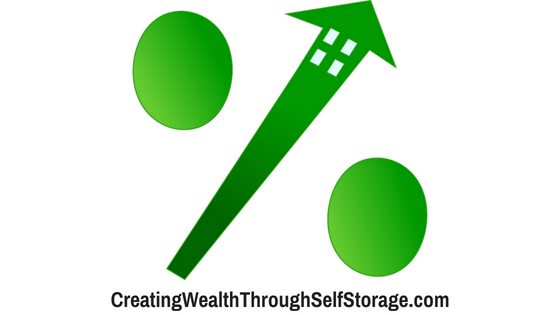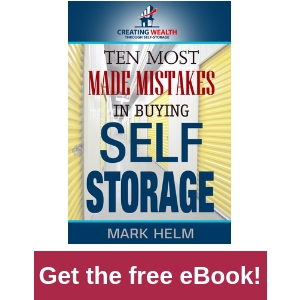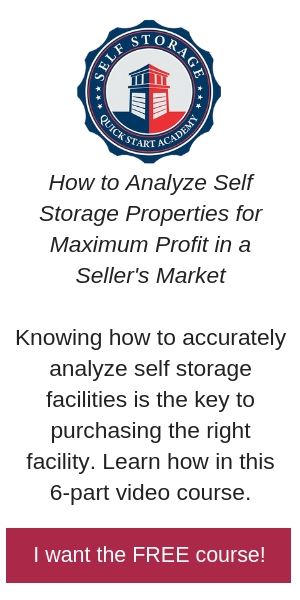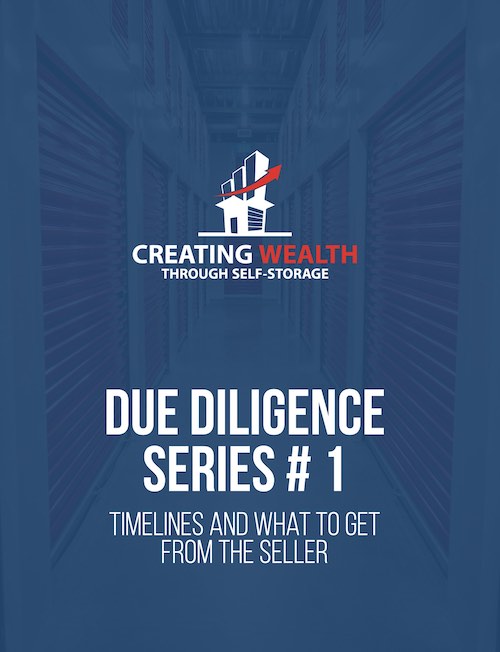Interest rates have gone up and will most likely continue to go up. That has an effect on the self storage industry.
As we move into the “Hyper Supply” phase of the real estate cycle (click HERE for details on the phases of the cycle) one of the historic moves of the Federal Reserve is to raise interest rates to slow down development.
I have been told that as interest rates go up, CAP rates will as well. (Capitalization Rates: for more information on CAP rates, click HERE).
However, when we had the initial interest rate increase in December 2015, and and the few since then, I didn’t notice any effect at all.
So I researched it.
I may not be the sharpest tool there is, but I see little evidence that CAP Rates move in lockstep with interest rates.
What I have seen in chart after chart (see example below) is that there is a loose correlation between interest rates and CAP rates. But I could see no direct correlation, even if you put in the lag time for construction.
What does affect CAP rates
What I did see is that CAP rates tend to follow sector fundamentals. In other words, as a product type has fundamental changes (i.e. supply/demand, population growth, economic spending and unemployment) CAP rates are more directly affected.
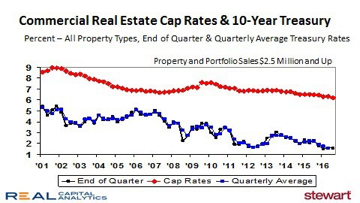
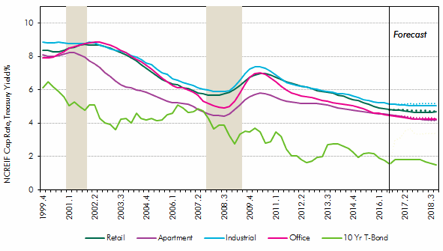
Fears that rising interest rates will cause higher CAP Rates are on the surface valid, but what I see as more of a threat is that they will reduce values.
As a self storage owner, my suggestion is that we put extra focus on keeping our Net Operating Income (NOI) up through this period. For the time being, we don’t need to focus on CAP rate increases.
We have no control over CAP rates but we can influence our NOI.
What has affected our NOI the most?
Since 2016 I have seen the following, in this order of magnitude:
- Rising property taxes
- Rising marketing cost in competitive markets (i.e. markets with lots of new supply)
- Leasing concessions in competitive markets
As I look at our portfolio, these are the factors that have had the most significant impact on our NOI.
I do think we are going to see CAP Rates go up soon, but it is more a factor of increasing vacancy rates rather than increasing interest rates.
As our self storage industry occupancy rates drop and self storage income flattens or goes down market by market, CAP rates will start going up.
Our job as business owners is to mitigate the downward NOI slide that will happen as the industry moves into a new phase of the real estate cycle. This will happen market by market, not for the industry as a whole.
What does that look like on the court?
Here are a few things we are doing. (Please share what you are doing in the comments below if it’s not included in this article!)
- Hire professionals to appeal out property tax increase.
- Monitor the rental rates in our submarkets like a hawk and know where we are and where we can possibly increase.
- Implement “Value Pricing Strategies.” (Click here for info on that if you are unfamiliar with that strategy). {Leslie link to episode 154).
- Utilize kiosks more, even in larger facilities, on off-peak hours to keep payroll down.
- Be very careful and use strategic online advertising strategies. In other words, don’t just outsource it to someone and hope it works.
- If expanding or building, use lower absorption rates in the Proforma and put in rent concessions in the income lines during lease up.
- Before you go into a new project, know the supply/demand and barrier of entry for that submarket.
Self Storage in all phases of the real estate cycle
The beauty of being in self storage over any other type of real estate (or business), is that in every cycle, the economic conditions generate demand for our product.
Our customers, for the most part, are in some kind of transition. Every phase in a real estate cycle creates transition.
We just have to have our attention on different areas of our business in the different phases.
So as the conversations begin to swing towards rising interest rates impacting CAP rates, understand that it’s more of an intellectual conversation. It’s interesting, but not very important to us as self storage owners and operators.
When the topic comes up, I simply smile, nod my head, and then put my attention back on what I can impact…the NOIs of our facilities.
